| Listing 1 - 10 of 48 | << page >> |
Sort by
|
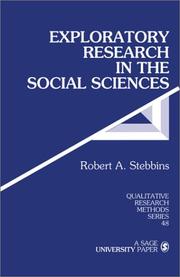
ISBN: 0761923985 0761923993 1412984246 1452214557 Year: 2001 Volume: vol. 48 Publisher: Thousand Oaks, Calif. Sage
Abstract | Keywords | Export | Availability | Bookmark
 Loading...
Loading...Choose an application
- Reference Manager
- EndNote
- RefWorks (Direct export to RefWorks)
Qualitative methods in social research --- Social sciences --- Sciences sociales --- Research --- Methodology --- Recherche --- Méthodologie --- #SBIB:031.AANKOOP --- #SBIB:303H10 --- #SBIB:303H0 --- Methoden en technieken: algemene handboeken en reeksen --- Methoden in de sociale wetenschappen: algemeen --- Methodology. --- Research. --- Méthodologie --- Social science research
Book
ISBN: 0837123399 Year: 1971 Volume: 5 Publisher: Westport, Conn.
Abstract | Keywords | Export | Availability | Bookmark
 Loading...
Loading...Choose an application
- Reference Manager
- EndNote
- RefWorks (Direct export to RefWorks)
Sociology of law --- Deviant behavior. --- Crime. --- Déviance --- Criminalité --- Déviance --- Criminalité
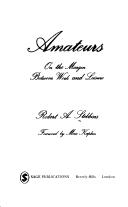
ISBN: 0803912005 Year: 1979 Publisher: Beverly Hills, Calif.
Abstract | Keywords | Export | Availability | Bookmark
 Loading...
Loading...Choose an application
- Reference Manager
- EndNote
- RefWorks (Direct export to RefWorks)
Sociology of sport --- Amateurism. --- Leisure --- Marginality, Social. --- Social aspects.
Book
ISBN: 0802075770 Year: 1994 Publisher: Toronto : University of Toronto press,
Abstract | Keywords | Export | Availability | Bookmark
 Loading...
Loading...Choose an application
- Reference Manager
- EndNote
- RefWorks (Direct export to RefWorks)
French language --- French-Canadians --- Canadians, French-speaking --- Canadiens français --- Français (Langue) --- Minorités --- Alberta, Northern --- Calgary --- Minorities
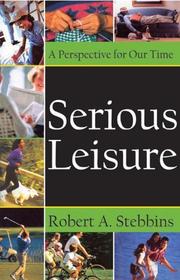
ISBN: 9780765803634 0765803631 9781412855945 Year: 2007 Publisher: New Brunswick, N.J. Transaction Publishers
Abstract | Keywords | Export | Availability | Bookmark
 Loading...
Loading...Choose an application
- Reference Manager
- EndNote
- RefWorks (Direct export to RefWorks)
Serious Leisure offers a comprehensive view and analysis of the current state of the sociology of leisure. Defining and differentiating the way people use their free time, Stebbins divides such activity into categories of serious, casual, and project-based leisure that he further separates into a variety of types and subtypes. Together they comprise what he calls "serious leisure."In this perspective, serious leisure constitutes systematic pursuit of an amateur, hobbyist, or volunteer activity sufficiently substantial and interesting in nature and requiring special skills, knowledge, and experience. Casual leisure, though immediately, intrinsically rewarding, is by contrast a relatively short-lived pleasurable activity, requiring little or no special training to enjoy it. Project-based leisure is a short-term, reasonably complicated, occasional creative undertaking carried out in free time. Stebbins sets out the basic concepts and propositions that make up the three forms, focusing on their essential elements. He takes stock of the serious leisure literature as well as that for casual and project-based leisure.Stebbins sees "serious leisure" realized by way of a set of foundational concepts--organization, community, history, lifestyle, and culture--and several of their component areas. He reviews the history and background of the concept of serious leisure and then adds historical commentary on, first, casual leisure and, then, project-based leisure. Finally, he examines the future and the importance of the serious leisure perspective in a globalizing world, and some of its critical links with other fields of knowledge and practice, notably the nonprofit sector and preventive medicine.Together with its original insights, Serious Leisure offers a single, handy, coherent, comprehensive resource. It will be of interest to sociologists, labor studies specialists, and economists. (Provided by publisher)
Leisure --- Loisir --- Sociological aspects. --- Aspect sociologique --- Sociological aspects --- #SBIB:39A4 --- #SBIB:316.7C400 --- #SBIB:316.7C410 --- Toegepaste antropologie --- Vrijetijdssociologie: algemeen --- Vrijetijdsonderzoek
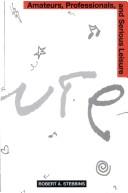
ISBN: 0773509011 9786612855887 1282855883 0773563342 9780773563346 9780773509016 Year: 1992 Publisher: Montreal ; Buffalo : McGill-Queen's University Press,
Abstract | Keywords | Export | Availability | Bookmark
 Loading...
Loading...Choose an application
- Reference Manager
- EndNote
- RefWorks (Direct export to RefWorks)
Throughout this project Stebbins has built on the work of Barney Glaser and Anselm Strauss and their notion of "grounded theory." First, Stebbins extensively observed the routine activities of amateurs and professionals in each field studied. Then, as he became more familiar with the life-styles of the participants, he conducted lengthy, unstructured, face-to-face interviews with, in most cases, thirty amateur or professional respondents. Each field demanded special methods of observation, analysis, interviewing, probing, and reporting. As much as possible, however, Stebbins asked similar questions of all respondents in all fields so as to permit generalizations across these diverse fields. The result was a "substantive grounded theory" of each field studied. In Amateurs, Professionals, and Serious Leisure, Stebbins has developed a "formal grounded theory" of amateurs and professionals based on the research accumulated in all eight substantive fields. By transcending a variety of contexts, he argues, one can gain a more enduring appreciation of the elements that affect peoples' experiences in work and leisure pursuits. A thorough review of the findings across this wide range of activities, including his findings and ideas on hobbyists and career volunteers, enabled Stebbins to derive better definitions of the main concepts of the project, such as "amateur," "the public," and "serious leisure" -- as well as "professional," where he distinguishes between client-centred and public-centred professionals who, while sharing numerous ideal-typical attributes, vary as to the power and control they have over their work in a democratic society. He presents inductive conclusions about careers and the costs and rewards in the eight amateur-professional fields considered. He examines the external world of amateurs and professionals in the light of such issues as family ties, relations among amateurs and professionals and among amateurs and their employers, public images, critics and journalists, community contributions, and the question of marginality for amateurs who are caught between the work world of the professional and the casual leisure world of the majority of the population. He concludes with an exploration of the future role of serious leisure in relation to predictions of greater unemployment and increased leisure time and longevity.
Recreation & Sports --- Social Sciences --- Amateurism. --- Professional employees. --- Leisure --- Work --- Social aspects. --- Professionals --- Nonprofessionalism --- Employees --- Dilettantism
Book
ISBN: 3319597949 3319597930 9783319597942 9783319597935 Year: 2017 Publisher: Cham : Springer International Publishing : Imprint: Palgrave Macmillan,
Abstract | Keywords | Export | Availability | Bookmark
 Loading...
Loading...Choose an application
- Reference Manager
- EndNote
- RefWorks (Direct export to RefWorks)
This book illustrates how leisure, as with other complex ideas that hold currency in today’s world, suffers at the level of common sense, due to a combination of oversimplification, moral depreciation, and even lack of recognition. Leisure’s modern legacy is both profound and immense, as a product of approximately 45 years of steady research, application and theory development. The common sense view of free-time activities, therefore, can and should be challenged. Stebbins provides this confrontation by tackling four particular themes: that gatekeepers within the institutions of higher education and funding agencies for research often fail to attach adequate resources to the idea of leisure; that the general population are guided by certain common sense definitions and largely unaware of how an informed view of free time could be beneficial; that practitioners within certain fields continue to refuse to engage with the idea of leisure despite its benefit for their clients; and that the weak reception of the science of leisure within mainstream social sciences suggests a similarly warped understanding of how people use their free time. Leisure’s Legacy will be of interest to scholars of Leisure Studies and all those wishing to learn more about the vital importance of leisure in modern Western society.
Leisure --- Social sciences. --- Religion and culture. --- Social sciences --- Sports --- Social philosophy --- Social theory --- Culture and religion --- Culture --- Behavioral sciences --- Human sciences --- Sciences, Social --- Social science --- Social studies --- Civilization --- Sociology of sports --- Sociology --- Free time (Leisure) --- Leisure time --- Recreation --- Philosophy. --- Sociological aspects. --- Leisure. --- Sports-Sociological aspects. --- Social sciences-Philosophy. --- Sociology of Sport and Leisure. --- Sociology of Culture. --- Social Theory. --- Sports—Sociological aspects. --- Culture. --- Social sciences—Philosophy. --- Cultural sociology --- Sociology of culture --- Popular culture --- Social aspects
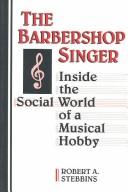
ISBN: 080207829X Year: 1996 Publisher: Toronot University Press
Abstract | Keywords | Export | Availability | Bookmark
 Loading...
Loading...Choose an application
- Reference Manager
- EndNote
- RefWorks (Direct export to RefWorks)
Barbershop singing. --- Music --- Social aspects.
Book
ISBN: 9781787147584 1787147584 1787147576 9781787147577 9781787430150 1787430154 Year: 2017 Publisher: Bingley, UK
Abstract | Keywords | Export | Availability | Bookmark
 Loading...
Loading...Choose an application
- Reference Manager
- EndNote
- RefWorks (Direct export to RefWorks)
Merit (Ethics) --- Self-esteem. --- Academic achievement --- Scholars --- Politicians --- Hommes politiques --- Réussite scolaire --- Mérite --- Savants --- Estime de soi. --- Social aspects --- Psychology. --- Aspect psychologique. --- Aspect social. --- Social aspects. --- Politicians. --- Statesmen --- Réussite scolaire --- Mérite
Book
ISBN: 1787697150 1787697134 1787697169 1787697142 9781787697133 9781787697157 9781787697164 Year: 2018 Publisher: Bingley
Abstract | Keywords | Export | Availability | Bookmark
 Loading...
Loading...Choose an application
- Reference Manager
- EndNote
- RefWorks (Direct export to RefWorks)
Anselm Strauss observed 40 years ago that the idea of social world was suffering from weak conceptualization and application to those areas of social life where this formation figures prominently in everyday activities. This book provides a coherent statement about what social worlds consist of, what they do, where they fit in social theory.
Leisure --- Sociological aspects. --- Social perception. --- Social Science --- Social, group or collective psychology. --- Sociology --- General. --- Cognition, Social --- Interpersonal perception --- Social cognition --- Interpersonal relations --- Perception --- Social cognitive theory
| Listing 1 - 10 of 48 | << page >> |
Sort by
|

 Search
Search Feedback
Feedback About UniCat
About UniCat  Help
Help News
News